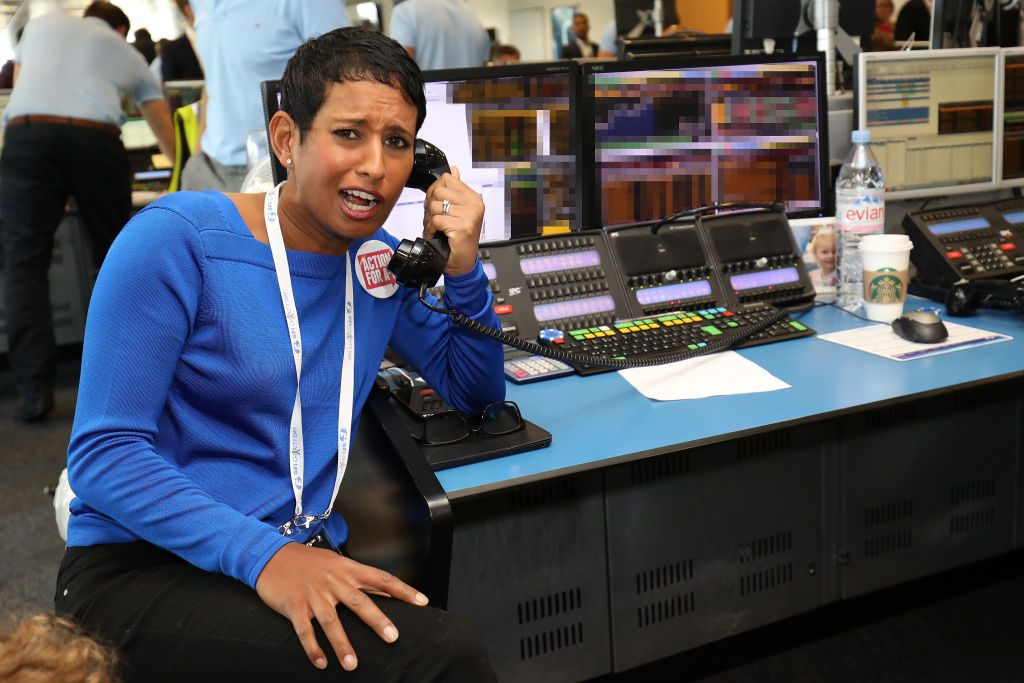All of the following things are true. Naga Munchetty, co-host of BBC Breakfast, is a very good TV journalist, one of the BBC’s best assets in fact. That tweet Donald Trump sent in July telling the non-white, female members of the Democratic ‘Squad’ to ‘go back’ to the countries they came from was racist. The BBC was correct, however, to partially uphold a complaint against Ms Munchetty for her on-air suggestion that the tweet was ‘embedded in racism’.
Why was the BBC correct to criticise one of its most important presenters for describing a racist tweet as racist? Because it is not a BBC reporter’s job to do that. It is not the role of an objective presenter with the national broadcaster to reveal their own thoughts or to seek to shape public opinion on political matters.
As the BBC said in its calm, balanced judgement on the Munchetty case, when it comes to deciding what motivates Trump, or what motivates all sorts of political people and events, ‘those judgements are for the audience to make’.
The coverage of the Munchetty case is getting out of hand. Accusations of institutional racism are flying about. You could be forgiven for think the Beeb is a foul, racist body and is picking on Ms Munchetty because she is a woman of colour. #IStandWithNaga trended on Twitter and virtually the entire chattering class seems to agree that she should have the right to express her opinions on air, whatever evil BBC bosses might think.
Everyone needs to calm down. Ms Munchetty is facing no sanction whatsoever for the comments she made on BBC Breakfast in July. In a conversation with her co-host Dan Walker about Trump’s tweet, she offered her own personal experience of racism. She has been told to ‘go back’ home. She then said that whenever she hears comments like the one Trump made, she feels they are ‘embedded in racism’. She seems to have recognised her mistake very quickly. ‘I’m not accusing anyone of anything here’, she said right away.
A complaint was made, and last week the BBC’s Editorial Complaints Unit partially upheld the complaint. Anyone who reads the ruling will know that the Beeb is not saying that Ms Munchetty must not speak about her own experience of racism. Nor is it saying she should be punished for suggesting Trump’s comments were ‘embedded in racism’ — ‘Munchetty is not facing any disciplinary action or reprimand’. It is simply trying to maintain the line between reporting and opinion, between the presentations of the news to the public and the expression of opinionated commentary.
This is an important line to hold, especially today when so many news presenters come off as hackneyed dispensers of the correct woke opinion on every issue under the sun. The old journalistic boundary between informing people about what has happened in the world and instructing them on how they should feel about it is being feverishly erased. From Channel 4 to the broadsheet press to some of the BBC itself, presenters and reporters who once might have striven for objectivity now think nothing of tweeting, stating and even wearing their opinions in public — think of Jon Snow’s Pride socks.
The erasure of the line between reportage and opinionising was made quite graphic by Emily Maitlis’s attack on Rod Liddle on Newsnight in July. Now, of course, Newsnight is not a straight news-reporting show — it has debate, too. But even so, this performance was extraordinary. In the debate about a second referendum, Maitlis sneered at Liddle, suggested he was a racist, and barely let him get a word in.
To many viewers it confirmed that the BBC has well and truly taken a political line on Brexit and that it views Leavers as xenophobic oafs who deserve public humiliation. It was a low point for the broadcaster. The BBC upheld a complaint against Ms Maitlis, just as it has now done with Ms Munchetty. Perhaps it is trying to get its house in order? To reorientate itself away from its woke, liberal-elite leanings and towards more neutral territory? Some may fear it is too little, too late.
In response to the Munchetty ruling, many are saying that ‘racism isn’t an opinion’ and that commenting on racism, including Trump’s racism, is an obligation that every journalist, including BBC journalists, must embrace. Leaving aside the fact that racism is an opinion — it’s a foul, prejudiced opinion that views certain peoples as inferior — the broader problem here is the idea that if something is obviously bad, obviously immoral, than even neutral journalists have a duty to condemn it. This is the opposite of the truth. It is when things are really awful that a special effort must be made by objective reporters and presenters to maintain forensic neutrality.
There are worse things than Trump’s dumb tweets. There is the war on Yemen. There’s the brutality of life in Venezuela. There’s the imprisonment of women in Iran for refusing to wear the hijab. Do we want BBC news reporters to look into the camera and instruct the viewing masses that Saudi Arabia is evil, Venezuela is a meltdown and compulsory hijab-wearing is a crime against female liberty? No. Just tell us the news, for God’s sake. We’ll decide the rest for ourselves, like the intelligent grown-ups that we are.







Comments